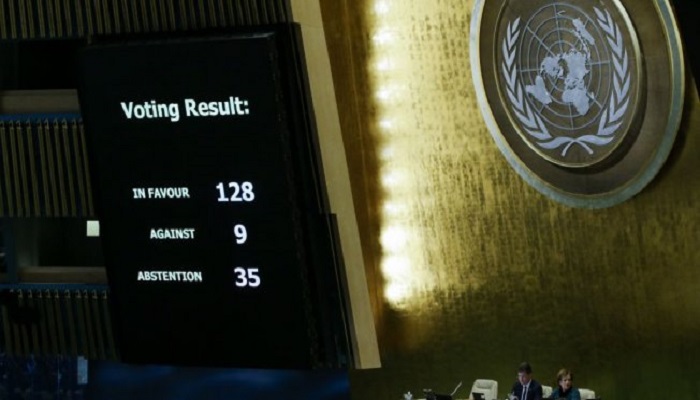
The acceptance of Jerusalem as the capital and the shifting of the US Embassy had created a global ruckus with the UN forces to take strict measures.
The UN General Assembly on Thursday adopted by a decisive vote of 128 to nine, with 35 abstentions, a motion rejecting the US decision to recognize Jerusalem as Israel’s capital.
President Donald Trump had warned ahead of the vote in the 193-nation assembly that “we’re watching” and threatened reprisals against countries backing the measure, which reaffirms that the status of Jerusalem must be resolved through negotiations.
Seven countries – Guatemala, Honduras, Togo, Micronesia, Nauru, Palau and the Marshall Islands – joined Israel and the United States in opposing the measure. These 7 countries are not diplomatic powerhouses.
Among the 35 countries that abstained were Argentina, Australia, Canada, Croatia, the Czech Republic, Hungary, Latvia, Mexico, the Philippines, Romania, and Rwanda.
Ukraine, which supported the draft resolution at the Security Council, was among 21 countries that did not turn up for the vote.
#UNGA adopts resolution on status of Jerusalem. Votes: 128 in favour; 9 against; 35 abstentions. pic.twitter.com/x21drrmQXb
— United Nations (@UN) December 21, 2017
The measure was sent to the General Assembly after it was vetoed by the United States at the Security Council on Monday, although all other 14 council members voted in favor.
“The United States will remember this day,” US Ambassador Nikki Haley told the assembly.
“America will put our embassy in Jerusalem,” Haley said. “No vote in the United Nations will make any difference on that. But this vote will make a difference on how Americans look at the UN and on how we look at countries who disrespect us in the UN. “When we make generous contributions to the UN we also have a legitimate expectation that our goodwill is recognized and respected,” she said.
While resolutions by the General Assembly are non-binding, a strong vote in support carries political weight.
Israel seized the largely-Arab eastern sector of Jerusalem during the 1967 Six-Day War and later annexed it, claiming both sides of the city as its “eternal and undivided capital.”
But the Palestinians want the eastern sector as the capital of their future state and fiercely oppose any Israeli attempt to extend sovereignty there.
Several UN resolutions call on Israel to withdraw from territory seized in 1967 and the resolution contains the same language as past motions adopted by the assembly.
Palestinians welcome support after UN vote on Jerusalem
The Palestinian president welcomed the resolution criticising the US government’s controversial recognition of Jerusalem as Israel’s capital.
“This decision reaffirms once again that the just Palestinian cause enjoys the support of international law, and no decision by any party can change the reality,” a statement from Palestinian President Mahmud Abbas’s spokesman said.

Post Your Comments